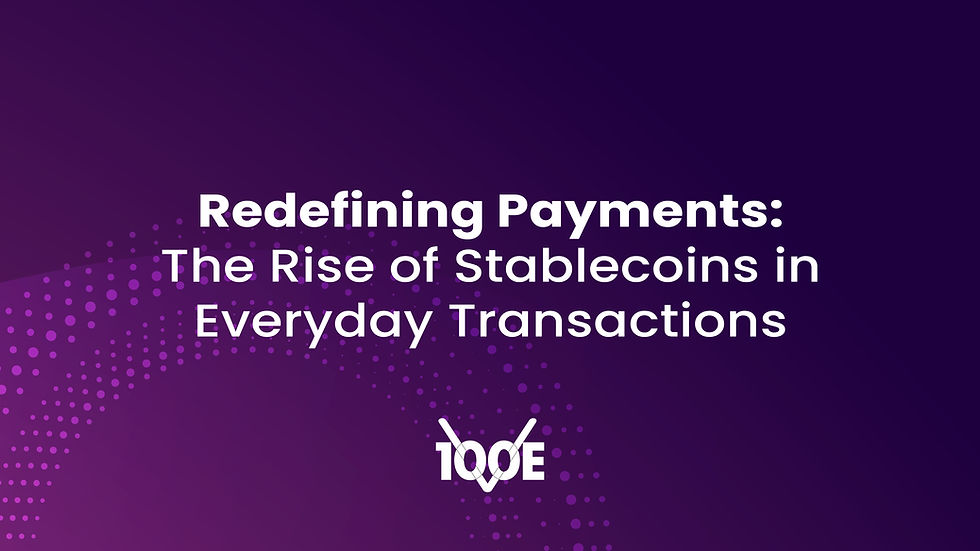Sustainability in Marketing: Green Branding and Eco-Friendly Messaging
- 100E Ventures

- Oct 6, 2024
- 3 min read
Updated: Oct 31, 2024

In today’s fast-evolving consumer landscape, sustainability has emerged as more than just a trend—it's now a critical component of successful brand strategies. Green branding and eco-friendly messaging are increasingly becoming essential for businesses to connect with environmentally-conscious consumers. Brands that prioritize sustainability not only contribute positively to the environment but also position themselves as forward-thinking and ethical, a trait highly valued by today's consumers.
This shift toward sustainable marketing is especially relevant for companies that want to stand out in a competitive market, and it aligns perfectly with the values of businesses like 100E Ventures, which invest in transformative ventures with a focus on innovation and responsible growth. As we explore the importance of sustainability in marketing, we’ll also look at how green branding and eco-friendly messaging can drive both business growth and social impact.
What is Green Branding?
Green branding refers to the development of a brand identity that is deeply connected with sustainability and environmentally friendly practices. This doesn’t mean just slapping a green logo on products, but ensuring that sustainability is embedded in the company’s DNA—from production processes to packaging, and from resource management to waste reduction. Companies that excel at green branding demonstrate a genuine commitment to reducing their ecological footprint.
An example of green branding can be found in the initiatives taken by eco-conscious brands like Patagonia, whose "Don’t Buy This Jacket" campaign challenged the norms of consumerism, encouraging people to think twice about their purchases. This approach not only resonated with environmentally aware audiences but also showcased Patagonia's commitment to sustainability as a core value.
The Power of Eco-Friendly Messaging
Eco-friendly messaging involves the communication of a brand's sustainability efforts to its audience in an authentic and transparent way. With the rise of the eco-conscious consumer, it’s no longer enough for companies to say they care about the environment— they must show it through tangible actions and clear communication.
Businesses should incorporate eco-friendly messaging across all their platforms—social media, websites, and product packaging—to educate and inform consumers about the steps they’re taking toward sustainability. Whether it’s using recycled materials, committing to carbon neutrality, or supporting reforestation programs, the key is authenticity. Consumers are quick to identify greenwashing, a practice where companies falsely market themselves as environmentally friendly, and will hold brands accountable for misleading claims.
100E Ventures, through its portfolio companies, encourages this type of honest communication. By investing in businesses that prioritize sustainability, they support brands that are not just making eco-friendly promises but are taking concrete actions to live up to them. The firm’s focus on responsible growth reflects its commitment to aligning with the values of today’s discerning, socially conscious consumers.
Benefits of Green Branding and Eco-Friendly Messaging
Stronger Customer LoyaltyConsumers, particularly millennials and Gen Z, are more likely to support brands that align with their values. Green branding helps build trust and loyalty, as customers feel connected to brands that care about the environment and contribute to a better future.
Increased Competitive AdvantageWith more companies jumping on the sustainability bandwagon, early adopters of green branding and eco-friendly messaging will find themselves ahead of the competition. Businesses that can prove their commitment to the planet are often rewarded with increased brand recognition and market share.
Cost Savings in the Long RunSustainable practices often lead to operational efficiencies and cost savings. Whether it’s reducing waste, improving energy efficiency, or optimizing supply chains, sustainability initiatives can also have financial benefits for companies.
Positive Brand PerceptionBrands that practice sustainability are seen in a more positive light by the public, and this goodwill can translate into stronger brand equity. By integrating sustainability into their core message, brands foster a sense of purpose, which helps them resonate with their audience on a deeper level.
How 100E Ventures Supports Sustainable Growth
At 100E Ventures, sustainability is more than just a buzzword. The venture capital firm actively seeks out investments in businesses that prioritize environmental responsibility and sustainable growth. By backing innovative companies with strong green initiatives, 100E Ventures contributes to building a future where profitability and sustainability go hand in hand.
For instance, the firm looks for startups that have embedded eco-friendly practices in their operations—from using renewable energy to adopting circular economy models. By aligning with such ventures, 100E Ventures not only supports the growth of green businesses but also ensures that its portfolio companies are future-proof, meeting the increasing demand for sustainable solutions.
Conclusion
Sustainability is no longer optional for brands—it’s a necessity. Green branding and eco-friendly messaging are powerful tools that allow businesses to build stronger relationships with consumers, gain a competitive edge, and contribute to the well-being of the planet. For companies like 100E Ventures, the focus on sustainability not only drives positive social change but also creates long-term business success.
As the world moves towards a more environmentally conscious future, brands that prioritize sustainable marketing will not only survive—they will thrive.




Comments